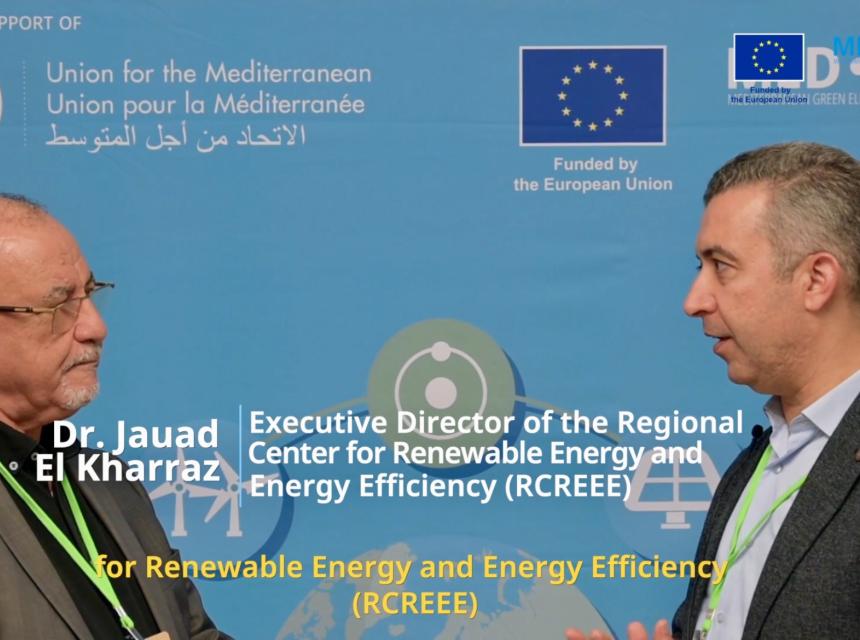RCREEE & GH2 : Accelerating the Arab World's Renewable Energy Transition
In an era where climate change demands urgent global action, the Arab region stands at a pivotal crossroads in its energy transition journey. When interviewed by dr Mustapha El Taoumi during the inaugural Mediterranean Green Week, organised by UfM, Dr. Jauad El Kharraz, Executive Director of the Regional Center for Renewable Energy and Energy Efficiency (RCREEE), emphasises the significant strides and challenges faced by Arab states in their quest to enhance renewable energy and energy efficiency.
🎦 Watch in Arabic with English Subtiles
Ambitious Renewable Energy Goals
Arab countries have set ambitious renewable energy targets, driven by the urgent need to mitigate climate change and reduce reliance on fossil fuels. Dr. El Kharraz highlights that the region aims to triple its renewable energy capacity by 2030, aligning with the recent declarations from international conferences. Currently, the region boasts a renewable energy capacity of approximately 27GW, with countries like Saudi Arabia, Morocco, and Egypt leading the charge with targets of 50%, 52%, and 42% renewable energy by 2030, respectively.
Achieving these goals necessitates substantial investments and comprehensive regulatory reforms. The region must attract private sector investments and introduce policies that facilitate the integration of new technologies, such as green hydrogen. Notable projects are already in progress or planned in countries like Morocco, Algeria, Egypt, Jordan, Saudi Arabia, and the UAE, showcasing a collective regional commitment to renewable energy.
The Energy Efficiency Challenge
While progress in renewable energy is encouraging, the Arab region's energy efficiency performance lags behind. Dr. El Kharraz notes that the energy efficiency rate in Arab countries is almost half the global average, underscoring the need for intensified efforts. The “meetMed” project, funded by the EU and involving eight Arab countries, aims to enhance energy efficiency in the building and electrical appliance sectors. Given that buildings contribute significantly to energy-related emissions, improving efficiency in this sector is crucial.
To bridge the energy efficiency gap, Arab countries must implement robust national policies, invest in energy-efficient technologies, and engage financial institutions to explore funding opportunities. Encouragingly, there are ongoing initiatives focusing on the transport and industrial sectors, which hold significant potential for energy savings.
The Role of Carbon Markets
A critical aspect of the energy transition is the establishment of carbon markets, which Dr. El Kharraz identifies as essential for aligning the Arab region with global climate policies. Although a unified global carbon price remains elusive, regional efforts, such as the agreement with the Global Carbon Council in Qatar, represent steps in the right direction. Preparing for the EU's carbon border adjustment mechanism (CBAM) by 2026 is imperative for maintaining competitiveness in the European market.
A unified approach to carbon pricing in the Arab region, akin to the unified Arab electricity market, would bolster exports and economic growth. Establishing a regional entity to oversee carbon pricing and mechanisms could provide the necessary framework for achieving carbon neutrality by 2050, a goal set by many Arab countries.
The Arab region's renewable energy transition is a complex yet attainable goal. With ambitious targets, significant investments, and comprehensive regulatory reforms, the region can position itself as a leader in renewable and clean energy. As Dr. El Kharraz optimistically notes, countries like Morocco, Algeria, Egypt, Jordan, Saudi Arabia, and the UAE are at the forefront of this transition. The path ahead requires collective effort, innovation, and a commitment to sustainable development, ensuring a greener and more resilient future for the Arab world.

